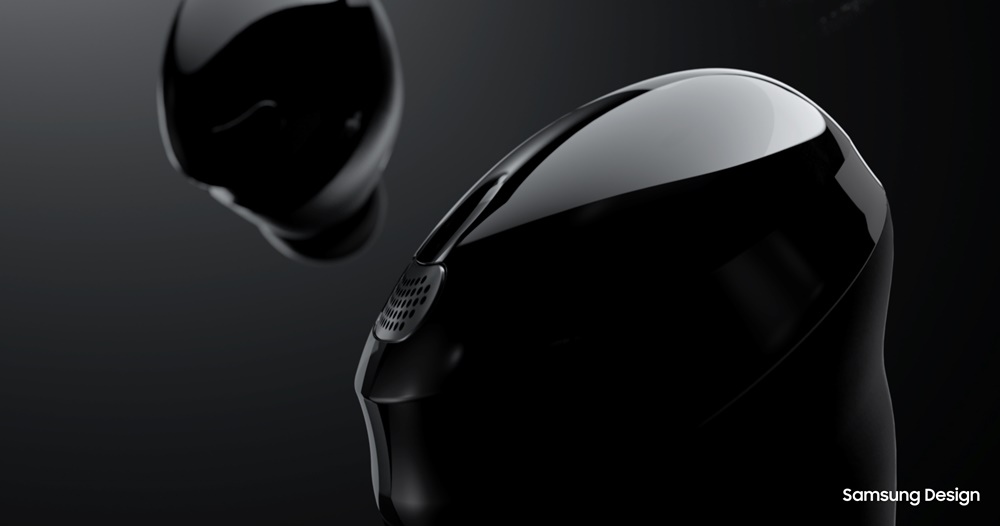
A common adage in the field of modern design is that ‘form follows function’, meaning that the design process should start with the product’s intended functionality rather than any aesthetic stimulation. This same principle was applied to Galaxy Buds Pro by the Samsung Electronics design team, who understood that wireless earphones must first and foremost provide the best possible experience to users.
The resulting design elements of Galaxy Buds Pro are the product of extensive research into the nature of wireless earbuds, their users and usage habits. Galaxy Buds Pro’s rounded shape with minimal external resistance was designed for optimal sound quality, while their ergonomic design makes for comfortable use and the application of sustainable materials to the product encourages environmentally-friendly processes. Thanks to the efforts of the designers, Galaxy Buds Pro’s design delivers better earbud experiences by prioritizing function as well as form.
A Shape that Truly Captures Sound

In order to mitigate the prevailing issues that contribute to the degradation of sound quality for wireless earphone users, namely external noise and wind sounds, Samsung’s designers undertook research into reducing these extraneous factors and delivering clearer sound quality. The resulting solution is a curved and rounded overall form factor that streamlines the earbuds to reduce resistance and enhance sound clarity.
The form factor of Galaxy Buds Pro is totally round, with no breaks or protrusions, in order to reduce any wind noise that might occur when wind brushes against the microphone hole. Galaxy Buds Pro’s aerodynamic design, snug inner-ear fit and noise-cancelling technologies help reduce unwanted noise and provide subtle, uninterrupted audio experiences.
Furthermore, today’s wireless earphones are used not just for listening, but for speaking, too, given the convenience they offer when a call comes through and a user’s hands are busy. In order to provide optimized sound capture experiences, too, Samsung’s designers comprehensively designed the internal structure of Galaxy Buds Pro to ensure the earbuds pick up sound as effectively as they produce it. A carefully-considered distance between Galaxy Buds Pro’s two microphones and the application of beamforming technology ensure that the earbuds vividly capture the user’s voice without interference.
“We considered the structure of both Galaxy Buds Pro’s exterior and its interior in order to provide the best sound quality, cooperating closely with the engineering department in order to provide the maximum user experiences within the smallest form,” noted the design team.
Convenience, Comfort and Individuality: An Ergonomic Fit


These days, wireless earphones are becoming more and more indispensable to their users, regardless of location, activity or time of day. Accordingly, the design team devised a size and shape for Galaxy Buds Pro that is suitable for any ear and every moment.
In order to create a design capable of comfortably suiting all types of ear size and shape, designers conducted earphone comfort surveys and researched the topic extensively in order to create several prototypes and mock-ups and find the optimal earbud design. “Our goal was to provide a fit that is stable and comfortable for as many users as possible,” noted the design team. “Based on our research of individuals with all kinds of ear shapes, we were able to define our optimum standard fit.”

Not only do Galaxy Buds Pro fit in almost any ear comfortably, but they also sit naturally thanks to the absence of wingtips or any other protruding factors. In order to stay secure in the ear without any wingtips, the three common points of the ear were taken into account: the tragus (extending outward in front of the earhole), the antitragus (lying across the tragus) and the helix (the space behind the earhole). When an earbud is settled around these three points, the need for wingtips is removed; accordingly, Galaxy Buds Pro fit comfortably, ergonomically and without the need for further protruding design aspects.
Sustainable Processes Make for Sustainable Sound Experiences

The hallmarks of a well-designed product include good aesthetics, novel functionalities and value that goes beyond the product itself. Regarding the latter, Samsung’s designers ensure that all their designs include long-term perspectives that consider every aspect of the product’s lifecycle, from the planning stages through to disposal. In order to provide customers with a product that promotes causes greater than just the intended function, Galaxy Buds Pro have been designed with a sustainable product cycle as well as with sustainable materials.
As with their predecessors Galaxy Buds Live, Galaxy Buds Pro feature the application of post-consumer materials (PCM) to their body and case. As such materials are recycled from end-of-life plastic, the harmful effects resulting from new plastic production can be reduced through the use of PCM. Galaxy Buds Pro’s designers were also careful to ensure that these sustainable materials were in no way fragile and offered optimized durability and aesthetic quality.
“Taking into account the strength and durability of the product, Galaxy Buds Pro feature 20% PCM,” highlighted the design team. “Given that Galaxy Buds Pro is not a single-use product, we worked hard to balance product longevity with sustainability. We will continue to work hard on devising sustainable product processes that extend even past the end of a product’s lifecycle.”

By constantly reflecting the needs and changing requirements of their users, Samsung has been steadily evolving the Galaxy Buds line. As well as always putting the user first, Samsung’s designers have developed innovative approaches to sound quality, comfort and sustainability, a relentless journey that has now resulted in Galaxy Buds Pro, a wireless earbud product that brings all kinds of benefits to its users and their daily lives.


